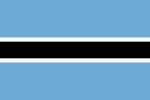Languages of Botswana
| Languages of Botswana | |
|---|---|
 Sign in English and Setswana at the National Botanical Garden of Botswana | |
| Official | English |
| National | Setswana |
| Recognised | Kalanga, Kgalagadi, Shona, Mbukushu, Ndebele, Tshwa, !Xóõ |
| Foreign | Portuguese, Danish, Swahili, German, Afrikaans, French, Arabic |
| Signed | American Sign Language Danish Sign Language German Sign Language[1][2] |
| Keyboard layout | |
| Part of a series on the |
| Culture of Botswana |
|---|
 |
| People |
| Languages |
| Cuisine |
| Religion |
| Art |
| Literature |
| Music |
| Sport |
The official language of Botswana is English, while Setswana is considered to be a national language.[3] English, which was inherited from colonial rule, is the language of official business and most written communication. Most of the population speak Setswana, but over 20 smaller languages are also spoken. Some of the country's languages are in danger of becoming extinct.
Official and national languages
[edit]The official written language of Botswana is English.[3] Most written communication and official business texts are written in English. The language of the Tswana people—Setswana—is the country's national language, and is spoken by most of the population.[4]
Other languages
[edit]Aside from English and Setswana, other languages are spoken in the country. Over 90% of the population speak a Bantu language as their first language.[citation needed] According to the CIA's World Factbook, the most common Bantu languages spoken are Setswana (73.3% of the population), Kalanga (17.2%), Kgalagadi (2.4%), Shona (1%) Mbukushu (1.6%) and Ndebele (1%). 1.7% speak Tshwa (a Khoe language) and 0.1% speak !Xóõ, a Tuu language (both non-Bantu).[5] English is spoken by 2.8% as their first language, and a small number speak Afrikaans.
The number of individual languages listed for Botswana is 31.[who said this?] All are living languages. Of these, 26 are indigenous and 5 are non-indigenous. Furthermore, 4 are institutional, 9 are developing, 8 are vigorous, 9 are in trouble, and 1 is dying.[6]
Languages spoken
[edit]
- Afrikaans
- Ani
- Birwa
- Chichewa
- English
- Gana
- Gciriku
- Gwi
- Hai||om
- Herero
- ‡Hua
- Ju|’hoansi
- Kalanga
- Kgalagadi
- Khoekhoe
- Khwedam
- Kua
- Kuhane
- Kung-Ekoka
- Lozi
- Mbukushu
- Nambya
- Naro
- Ndebele
- Setswana
- Shua
- Tshuwau
- Tswapong
- !Xóõ
- Yeyi
- Zezuru
- isiXhosa
References
[edit]- ^ Lucas, Ceil; Schembri, Adam C. (February 12, 2015). Sociolinguistics and Deaf Communities. Cambridge University Press. ISBN 9781107051942 – via Google Books.
- ^ Monaghan, Leila Frances; Nakamura, Karen; Schmaling, Constanze; Turner, Graham H. (August 16, 2003). Many Ways to be Deaf: International Variation in Deaf Communities. Gallaudet University Press. ISBN 9781563681356 – via Google Books.
- ^ a b "About Our Country". Gov.bw. Retrieved 2022-04-17.
Botswana has a number of tribes across the country, collectively known as Batswana. The official language is English and Setswana is the national language, although there are other spoken languages.
- ^ Mwakikagile 2009, p. 75.
- ^ "The World Factbook — Central Intelligence Agency". www.cia.gov. Retrieved 2016-09-19.
- ^ "Botswana". Ethnologue. Retrieved 2019-07-17.
Sources
[edit]- Mwakikagile, Godfrey (2009). Botswana Since Independence. Pretoria: New Africa Press. ISBN 9-780-98025-878-3.
Further reading
[edit]- Chebanne, Andy Monthusi (2008). "A Sociolinguistic Perspective of the Indigenous Communities of Botswana". African Study Monographs. 29 (3). Kyoto University: The Center for African Area Studies: 93–118. doi:10.14989/66231.

- Chabanne, Andy Monthusi (2012). "Where Are the 'Skeletons' of Dead Khoisan Languages?". Botswana Notes and Records. 44. Botswana Society: 81–92. JSTOR 43855562. Retrieved 26 September 2020.
- Ramsay, Jeff; Morton, Barry; Morton, Fred (1996). Historical dictionary of Botswana. Lanham: Scarecrow Press. ISBN 0810831430.

- Vossen, Rainer, ed. (2013). The Khoesan Languages. Psychology Press. ISBN 9-780-70071-289-2.
See also
[edit]External links
[edit]- Ethnologue listing of Botswana languages (subscription required)
- A list of endangered languages in Botswana from the Endangered Languages Project (ELP)
- The Kalahari Basin area: a 'Sprachbund' on the verge of extinction, from the Kalahari Basin area project (KBA)

